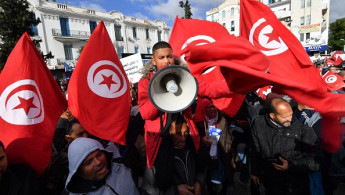Tunisia to criminalise normalisation with Israel with life sentence
Tunisia's parliament is set to ratify an urgent draft law criminalising ties with Israel with up to life in prison sentence.
On 30 October, the Tunisian parliament is scheduled to discuss a seven-chapter draft law that criminalises "normalisation with, recognition of, and dealing with the Zionist entity."
The draft was first presented to the Parliament in July by the "Sovereign National Line" bloc, an alliance of the nationalist People's Movement and the leftist United Democratic Patriots Party.
Amid the Israeli war on Gaza, 97 representatives requested its urgent consideration, and accordingly, the Parliamentarian Committee on Rights and Freedoms has worked to expedite its discussion and study.
What are the punishable forms of normalisation under the law?
The draft law criminalises deliberately carrying out, participating in, or attempting to trade, communicate, and cooperate in economic, cultural, and military activities. It also criminalises any relationship with Israel, directly or through mediation.
"It also bans participation in international forums and organisations that take place in the territories of the Zionist entity," Youssef Tarshoun, the head of the Sovereign National Line Bloc, confirmed to Al-Araby Al-Jadeed, the Arabic-language sister publication to The New Arab.
The Tunisian MP said the life imprisonment penalty is for "the crimes of espionage, supporting the Zionist enemy, and carrying weapons against the Palestinians, along with the crime of placing oneself at the mercy of the Zionist entity."
"The rest of the normalisation crimes, such as participating in a football match or a music concert, do not result in a life sentence, but rather penalties ranging from 6 to 12 years, with a fine ranging from 10,000 (US$3,148) to 100,000 dinars (US$31,482)." added the Tunisian MP.
However, the draft law will not affect Tunisia's relationship with countries that have already signed the normalisation accords with Israel, according to Imad Oulad Jibril, an MP and a member of the Rights and Liberties Committee.
"For example, we deal with Morocco, and it chose to normalise its relationship. (...) Our commercial relationship remains valid, and relations of friendship and brotherhood continue," Oulad Jibril told Al-Araby Al-Jadeed.
The Rights and Liberties Committee said it has submitted a request to the Presidency of the Republic and the Ministry of the Interior but has not received any response. "Due to the urgency, we chose to continue discussing the law (without waiting for the President's comments)," said Oulad Jibril.
Once the parliament passes a bill, it is sent to the president for approval. President Saeid can approve the law, in which case it is promulgated and becomes law, or he can return it to the parliament for further consideration.
'For the first time, Saied and the people are on the same side'
For the past months, several reports have suggested a potential normalisation between Tel Aviv and Tunis as Israel endeavours to widen its influence on North Africa.
However, President Kais Saied has ruled out any chance of establishing diplomatic ties with Israel.
"The word normalisation does not exist for me when it comes to Israel," said Saied in a speech in August.
Since the start of the Israeli war on Gaza, hundreds of Tunisians protested daily in solidarity with the right of Palestinians to liberate their land while calling for criminalising the normalisation. Those rallies witnessed the presence of Saied's dissidents, who are under trial for their opposition, and Saied's supporters.
The Tunisian Presidency has affirmed its "total and unconditional" solidarity with the Palestinian people and their right to recover their occupied lands.
"For the first time in the history of our country, there is absolute harmony between the will of the people and the head of the executive authority, which is the President of the Republic," Tunisian MP Youssef Tarshoun said.
However, some commentators are concerned that the Tunisian authorities might exploit the criminalisation of normalisation with Israel to put more opponents behind bars, in a similar scenario with the use of the "conspiracy against the state" law to bring to trial over 20 renowned dissidents who categorically deny the accusations.





 Follow the Middle East's top stories in English at The New Arab on Google News
Follow the Middle East's top stories in English at The New Arab on Google News


